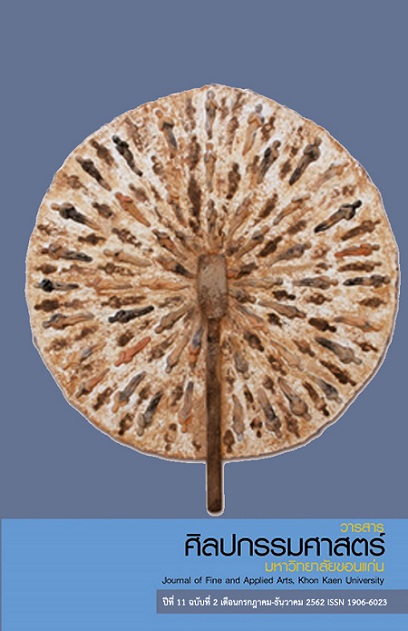A study of Aural Skill in Basic Chord Structure in Music Students of Phitsanulok Province
Main Article Content
Abstract
This study employed mixed-research methodology with the purposes of discovering the aural skill of for basic chords and the ways to encourage learning the basic-chords aural skill of the Western Music Major students, Phitsanulok Province. The participants of this study were 48 second-year students, including 19 from Western Music Major, Department of Music, Faculty of Humanities, Naresuan University, and 29 from Western Music Major, Faculty of Humanities and Social Sciences, Pibulsongkram Rajabhat University. The criteria for volunteering were that the students must have passed a course from their university’s curriculum, which included the context and practical lesson about the chord aural skill; and they must have been registered as a second-year student of Naresuan University and Pibulsongkram Rajabhat University of academic year 2018. The participants will be called “Volunteers” in this study. The researcher has divided the research study into 2 phrases. Phrase I, the researcher has used the aural skill examination form which is the tool to measure the basic-chord aural skill of the volunteers. Phrase II, the researcher has applied qualitative research method, such as group discussion to discover the way to encourage the volunteers’ basic-chord aural skill.
The result of the basic-chord aural skill of the 48 Western Music students in Phitsanulok was found that 52.09 percentage of the volunteers had the basic chord aural skill in improvement needed level. This was in a high number comparing to the rest amount of the students. Therefore, there should be the ways to improve the basic-chord aural skill. According to the study of the ways to encourage learning the basic-chord aural skill, it was found that the instructors should understand the diversity of the students’ capability. They should create more attractive ways to make the students more interested in practicing. For the teaching methods, the instructors should improve the teaching methods to be more appropriate and encouraging the students to be able to learn and analyze the contexts by themselves. For the teaching supporters, it was found that the teaching media were inadequate. There should be the development of teaching media or more up-todate innovation for the easier access and self-learning of the students.
Article Details
Content and information in articles published in the Journal of Fine and Applied Arts of Khon Kaen University is regarded as the opinion and sole responsibility of the author(s) directly; therefore, editors are not obliged to agree to or share any responsibility with regard to the content and information that appears within these articles.
All articles, information, content, image, etc. that have been published in the Journal of Fine and Applied Arts of Khon Kaen University is the copyright of the Journal of Fine and Appllied Arts of Khon Kaen University. Any person or organization who wishes to distribute all or parts of the articles for further dissemination or other usage must first receive permission from the Journal of Fine and Applied Arts of Khon Kaen University before proceeding to do so.
References
ณรุทธ์ สุทธจิตต์. (2535). สังคีตนิยม : ความซาบซึ้งในดนตรีตะวันตก. กรุงเทพฯ : จุฬาลงกรณ์มหาวิทยาลัย.
บุญชม ศรีสะอาด. (2553). การวิจัยเบื้องต้น. กรุงเทพฯ : สำนักพิมพ์สุวีริยาสาส์น.
รัตนะ บัวสนธ์. (2552). การวิจัยและพัฒนานวัตกรรมการศึกษา. กรุงเทพฯ : คําสมัย.
วิบูลย์ ตระกูลฮุ้น. (2561). ทฤษฎีดนตรีตะวันตก (WESTERN MUSIC THEORY). กรุงเทพฯ : สำนักพิมพ์แห่งจุฬาลงกรณ์มหาวิทยาลัย.
วิภาวี ศิริลักษณ์. (2557). การพัฒนาตัวบ่งชี้ทักษะของนักเรียนในศตวรรษที่ 21. วิทยานิพนธ์ปริญญาการศึกษามหาบัณฑิต (วิจัยและประเมินผลการศึกษา). บัณฑิตวิทยาลัยมหาวิทยาลัยนเรศวร.
Darling-Hammond, L., & McCloskey, L. (2008). Assessment for Learning around the World What Would it Mean to Be Internationally Competitive. Phi Delta Kappan, 90(4),263-272.
Karpinski, G. S. (2000). Aural skills acquisition The development of listening, reading, and performing skills in college-level musicians. Oxford, England: Oxford University Press.
Krueger, R. A. and Casey, M. A. (2000). Focus group: A practice guide for applied research. (3rd ed). California: SAGE.
Morgan, D.L. and Kruger, R. A. (1993). When to use focus groups and why. In Morgan, D.L.Successful Focus Group: Advancing the state of the Art. Thousand Oaks, CA: SAGE.
Reitan, I. E. (2009). Students’ attitudes to aural training in an academy of music. Nordic Research in Music Education. Yearbook Vol. 11 2009, 207-220.
Rolf, I. G. and Marc, L. (2010). Musical Gestures Sound, Movement, and Meaning. New York and London. Routledge Taylor & Francis Group.
Rosanna, L. B. (2006). A Practical Guide to Focus-Group Research, Journal of Geography in Higher Education, 30:3, 463-475, DOI: 10.1080/03098260600927575.
Tyagi, B. (2013). Listening: An important skill and its various aspects. The Criterion: An International Journal in English, 4(12), 1-8.
Wright, C. R. (2016). Aural and the University Music Undergraduate. Cambridge Scholars Publishing. Lady Stephenson Library. Newcastle upon Tyne. NE6.PA.UK.


